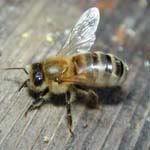
We haven't found out what's killing our honey bees yet:
WASHINGTON - Food prices could rise even more unless the mysterious decline in honey bees is solved, farmers and businessmen told lawmakers Thursday.We're turning our oceans into an acid bath:
[snip]
About three-quarters of flowering plants rely on birds, bees and other pollinators to help them reproduce. Bee pollination is responsible for $15 billion annually in crop value.
In 2006, beekeepers began reporting losing 30 percent to 90 percent of their hives. This phenomenon has become known as Colony Collapse Disorder. Scientists do not know how many bees have died; beekeepers have lost 36 percent of their managed colonies this year. It was 31 percent for 2007, said Edward B. Knipling, administrator of the Agriculture Department's Agricultural Research Service.
"If there are no bees, there is no way for our nation's farmers to continue to grow the high quality, nutritious foods our country relies on," said Democratic Rep. Dennis Cardoza of California, chairman of the horticulture and organic agriculture panel. "This is a crisis we cannot afford to ignore."
Food prices have gone up 83 percent in three years, according to the World Bank.

FORT LAUDERDALE, Florida (Reuters) - Like a tooth dipped in a glass of Coca-Cola, coral reefs, lobsters and other marine creatures that build calcified shells around themselves could soon dissolve as climate change turns the oceans increasingly acidic.We are running out of rain forests, wood, and land to grow crops:
The carbon dioxide spewed into the atmosphere by factories, cars and power plants is not just raising temperatures. It is also causing what scientists call "ocean acidification" as around 25 percent of the excess CO2 is absorbed by the seas.
The threat to hard-bodied marine organisms, such as coral reefs already struggling with warming waters, is alarming, and possibly quite imminent, marine scientists gathered this week for a coral reef conference in Fort Lauderdale, Florida, said.
Demand for land to grow food, fuel crops and wood is set to outstrip supply, leading to the probable destruction of forests, a report warns.We're losing the penquins:
The Rights and Resources Initiative (RRI) says only half of the extra land needed by 2030 is available without eating into tropical forested areas.
RIO DE JANEIRO, Brazil - Hundreds of baby penguins swept from the icy shores of Antarctica and Patagonia are washing up dead on Rio de Janeiro's tropical beaches, rescuers and penguin experts said Friday.

And what we're not losing is being made toxic:
The Maine Center for Disease Control said Friday that lobster meat is perfectly safe but that people should not eat the tomalley — a soft green substance found in the body of the lobster.And:
High levels of toxic algae known as red tide have been recorded along Maine's coast this summer, forcing the state to close many areas to clam and mussel harvesting. Tomalley functions as the lobster's liver by serving as a natural filter for contaminants that are in the water.
WASHINGTON - The tomato scare may be over, but it has taken a toll — it's cost the industry an estimated $100 million and left millions of people with a new wariness about the safety of everyday foods.I'm reading Jared Diamond's Collapse which talks about societies which become unsustainable yet the people continue to misuse and use up their resources. Overpopulation is one factor. Inability to anticipate and plan for future disasters is another. What is happening now has been repeated several times before.
I just never expected to actually be here when everything broke all at once.
crossposted at SteveAudio
2 comments:
I have so few bees in my garden, compared to wasps, butterflies, and other flying insects. It's alarming indeed.
CCD seems to be attacking (hatching? breeding? infecting?) only the commercial hives. Wild hives and even hobbyists hives don't seem to be affected. (At least they weren't when I was first reading about it).
They think it might be a combination of many things: stress and overwork, viruses, bacteria, pesticides, cell phones (which has since been proved wrong), honey bee stock overbreeding, etc etc... take your pick.
Meanwhile... we will have to go out with tiny paint brushes for the tomato blossoms and fertilize our own tomatoes....
Post a Comment